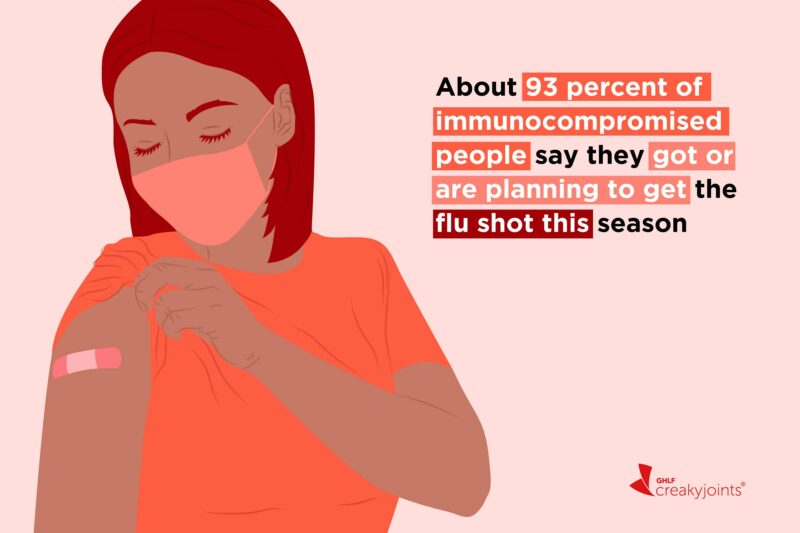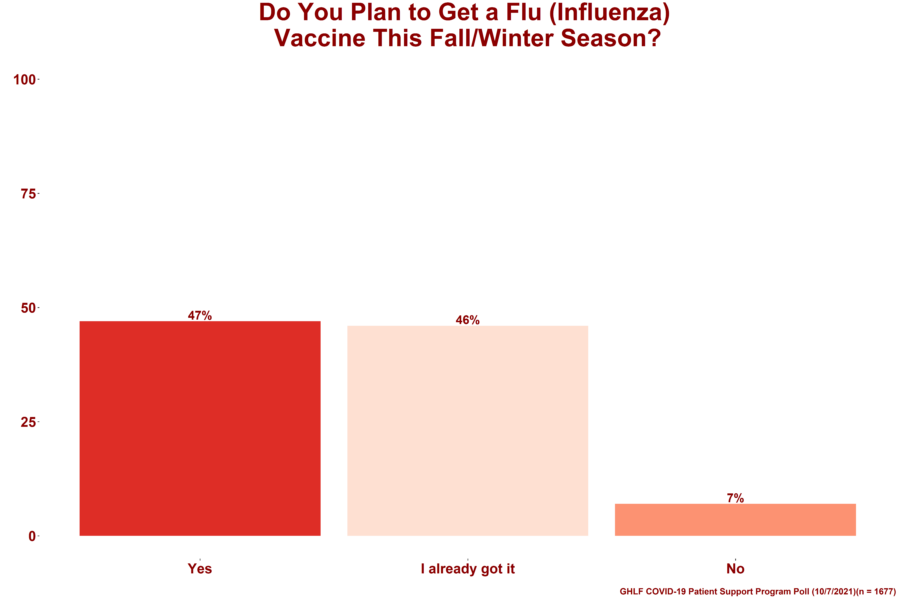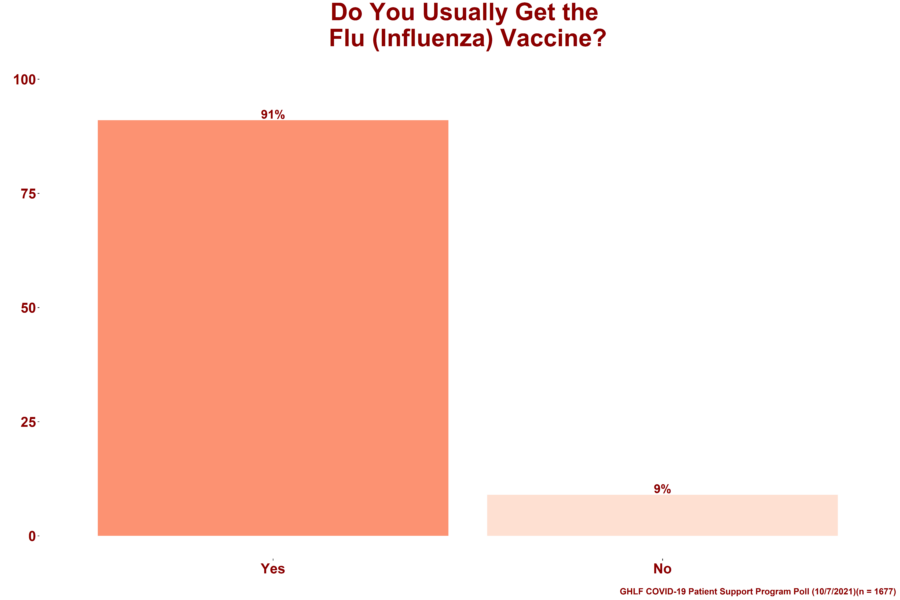Learn more about our FREE COVID-19 Patient Support Program for chronic illness patients and their loved ones.
Think back on the fall of 2020. The United States was averaging around 40,000 COVID-19 cases a week, according to the U.S. Centers for Disease Control and Prevention (CDC). Phase 3 trials for the COVID-19 vaccine were still being conducted. Mitigation efforts, such as wearing a mask and social distancing, were being strictly enforced. The times were not easy. But there was one piece of positive news to come out of this time: the flu seasons was virtually nonexistent.
There are normally tens of millions of flu cases yearly in the United States. But in 2020, there were only a few thousand accounted for between June 2020 and June 2021, per the CDC.
Now, a year later, things have changed. Average weekly COVID-19 cases range from 85,000 to 90,000. There are three COVID-19 vaccines available in the United States, but the CDC notes that only 66 percent of eligible people are fully vaccinated. Mitigation efforts have fallen by the wayside, only practiced by the extra cautions. As a result, the United States is likely to experience a flu season that’s similar to, if not worse than, those of pre-COVID times.
“Although measures taken for COVID-19 protections may have suppressed the most recent flu season in the United States, the influenza virus remains one the single deadliest infections today,” Robert Popovian, PharmD, MS, Chief Science Policy Officer at the Global Healthy Living Foundation and a senior health policy fellow at the Progressive Policy Institute, said in a recent article on MorningConsult.com.
One way to protect yourself against the flu — and minimize the number of cases around the country — is to get your flu vaccine. This is especially important for immunocompromised people, who have an increased risk of contracting the flu and experiencing serious flu complications.
But for this group of people, getting a flu vaccine isn’t as simple as going to the nearest pharmacy. Those who take immunosuppressant medications have to time the vaccine with their treatment is to ensure they garner a proper response. And this year, there is the added factor of the COVID-19 vaccine, which also must be timed correctly. Not to mention, people who experienced side effects following the COVID-19 vaccine may be hesitant to get another vaccine that could throw their body for a loop.
The Global Healthy Living Foundation’s COVID-19 Patient Support Program aimed to gain more insight into how its immunocompromised and high-risk community members planned to approach the upcoming flu season — specifically, whether they would be getting their flu shot this year and, if so, how they would time that with the third COVID-19 dose and various treatments.
Of the 1,677 survey respondents (98 percent of whom report being fully vaccinated), 47 percent plan on getting the flu vaccine this year, while 46 percent have already gotten it.
This makes sense when you consider the number of respondents who have historically gotten the flu shot. Of the total respondents, 91 percent said they usually get the flu vaccine. In a free response section where respondents could elaborate on the answers provided in the survey, many patients who regularly get the flu vaccine emphasized the importance of getting it this year because of the coronavirus.
“I always get the flu vaccine, [but] I think it’s more important than ever for this season because of COVID,” one person wrote.
Similarly, another respondent wrote, “I always get the flu shot because it is cheap insurance against the flu. It’s very important this year, as is the third COVID-19 shot.”
“I’m definitely getting the flu shot, as a couple friends got the flu already and they were miserable,” one patient wrote. “Not to mention, COVID is spreading worse now than in 2020 and I don’t want to weaken my system from the flu, leaving me vulnerable to COVID.”
Several patients noted the number of hospitalizations due to COVID-19 as one of their reasons for getting the flu vaccine.
“I always [get the flu shot] and think it makes sense to do so, especially now with hospitals being so full and masks being refused by many,” one patient shared.
“I think this is the most important year to get the flu shot,” another patient wrote. “Flu season last year was mild because of masking. This year we are seeing less masking which to me means a worse flu season, so having any protection will be extremely helpful.”
Here are some other key learnings and insights from the poll.
Immunocompromised people are figuring out how to time the flu shot with the third COVID-19 vaccine, as well as treatments.
People who take immunosuppressant medication for an inflammatory or autoimmune condition have likely talked to their doctor about timing COVID-19 vaccine doses with their treatment. And, chances are, they have had conversations in the past about timing treatments with the flu vaccine. But figuring how to time two vaccines with treatment is a whole different equation — one that several respondents are trying to solve.
“[I’m] trying to space vaccines out so my immune system doesn’t get overloaded, especially with my medications,” one person wrote.
“I’m currently tapering off prednisone and methotrexate, and want to wait to get the flu shot when my steroid intake is lower so I can have a better response,” another patient shared.
Though the timing between treatments and vaccinations — whether for COVID-19, the flu, or other viruses — will vary based on individual patient needs, the consensus is to hold certain immunomodulatory or immunosuppressive medications for one to two weeks. But does this mean you have two wait two weeks between vaccines as well?
According to the CDC, you can get any COVID-19 vaccine (not just the third dose) and flu vaccine at the same time. Still, your doctor might advise you wait, as was the case with survey participants.
(Of the 1,541 respondents who shared whether they plan on getting the third COVID-19 vaccine dose, 47 percent plan on getting it, while 46 percent already got it.)
When patients were asked what their doctor said about timing the third COVID-19 vaccination and flu vaccine:
- 5% were told to get the vaccines at the same time
- 3% were told to get the flu vaccination first, wait 2 weeks, then get the third dose
- 7% were told to get the third COVID-19 vaccination first, wait 2 weeks, then get the flu shot
- 7% were told to get the vaccine 2 weeks apart, with no preference of order
- 57% were not told anything about timing from their doctor
- 21% were told a timing schedule that wasn’t listed
As always, it is important to talk to your doctor before making any health-related decisions.
Read more about timing the flu shot, COVID-19 vaccine, and immunosuppressive medications.
Immunocompromised people hope healthy people will get the flu shot to further protect the high-risk community.
Though many community members are choosing to protect themselves against the flu this year, they know that their efforts can only do so much.
“I hope everyone who is medically able gets vaccinated against the flu,” one patient wrote. “Not only for themselves, but to help protect others.”
“I will do what I can to protect myself and my fellow humans,” another person shared. “I always believed that if there is something out there that will protect you against disease, why not take advantage of that?”
Another patient simply wrote, “it is my hope that everyone will get the flu vaccine as well as the COVID-19 vaccine,” a thought which was echoed by many others in the free response section.
In addition to getting the shot, you can protect yourself against the flu by continuing to take precautions, such as wearing a masking, social distancing, and washing your hands. You can also talk to your loved ones about getting their annual shot, emphasizing the impact it can have on your life.
As one patient perfectly said, “please encourage people to get the flu shot — they save lives.”
The Global Healthy Living Foundation is committed to providing ongoing education about COVID-19 vaccines for the chronic illness and immunocompromised community.
To stay informed about the latest COVID-19 vaccine news for people who are immunocompromised, take immunosuppressant medications, or have autoimmune conditions, follow all of our COVID-19 vaccine coverage here.
Get Free Coronavirus Support for Chronic Illness Patients
Join the Global Healthy Living Foundation’s free COVID-19 Support Program for chronic illness patients and their families. We will be providing updated information, community support, and other resources tailored specifically to your health and safety.
About the Patient Support Program Quick Poll
Members of our program have underlying health issues — such as inflammatory arthritis and other autoimmune conditions, heart disease, lung disease, diabetes, and more — that may increase their risk for COVID-19 complications. They are interested in understanding the best ways to stay safe during the pandemic and to be part of a community of people with similar concerns, questions, and fears.
We regularly poll members, who live in the U.S. as well as around the globe, about a variety of topics, including how the pandemic is affecting their lifestyle, mental health, chronic disease management, medication adherence, and more.
We use this information to inform the educational resources we provide and to inform other stakeholders — such as public health experts, policymakers, advocacy groups, health care professionals, and pharmaceutical companies — about chronic illness patients’ needs and concerns. You can participate in ongoing polls by joining the support program here.
COVID-19 Data Tracker. COVID-19 Vaccinations in the United States. U.S. Centers for Disease Control and Prevention. https://covid.cdc.gov/covid-data-tracker/#vaccinations_vacc-people-onedose-pop-12yr.
COVID-19 Data Tracker. U.S. Centers for Disease Control and Prevention. https://covid.cdc.gov/covid-data-tracker/#trends_dailycases.
COVID-19 Data Tracker Weekly Review. U.S. Centers for Disease Control and Prevention. October 8, 2021. https://www.cdc.gov/coronavirus/2019-ncov/covid-data/covidview/index.html.
Frequently Asked Influenza (Flu) Questions: 2021-2022 Season. Influenza. U.S. Centers for Disease Control and Prevention. September 22, 2021. https://www.cdc.gov/flu/season/faq-flu-season-2021-2022.htm.
Popovian R, et al. We Should Not Lose Sight of the Upcoming Flu Season. Morning Consult. September 27, 2021. https://morningconsult.com/opinions/we-should-not-lose-sight-of-the-upcoming-flu-season/.
Weekly U.S. Influenza Surveillance Report. Influenza (Flu). U.S. Centers for Disease Control and Prevention. June 19, 2021. https://www.cdc.gov/flu/weekly/index.htm.








